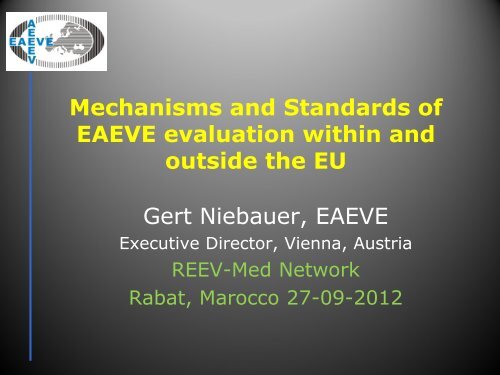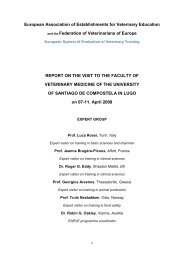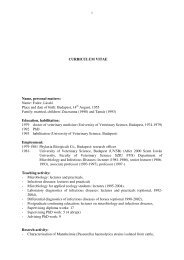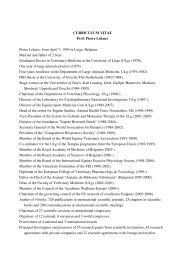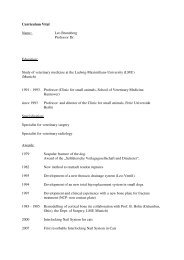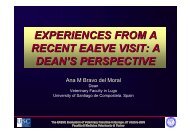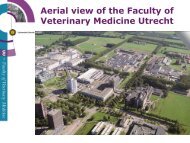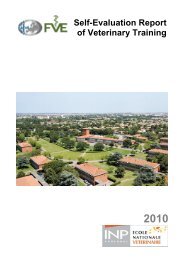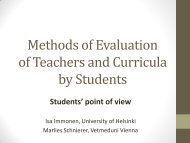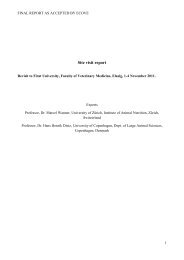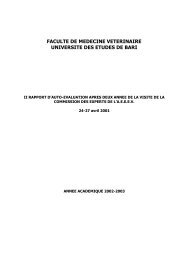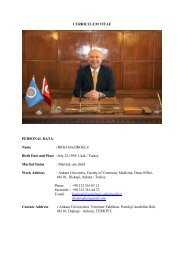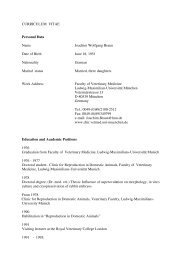download - EAEVE
download - EAEVE
download - EAEVE
You also want an ePaper? Increase the reach of your titles
YUMPU automatically turns print PDFs into web optimized ePapers that Google loves.
Mechanisms and Standards of<strong>EAEVE</strong> evaluation within andoutside the EUGert Niebauer, <strong>EAEVE</strong>Executive Director, Vienna, AustriaREEV-Med NetworkRabat, Marocco 27-09-2012
European accreditation system- the 27 and beyondBasic political concept of European Union:• Free movement of people, services -regulatedprofessions – and goods, mutual recognition ofacademic degrees and titles• Consequently standardisation&harmonisationmonitoring&evaluation of academic and professionaltraining required-<strong>EAEVE</strong> unique among reg.professions• Mission of <strong>EAEVE</strong> ” to support, promote anddevelop veterinary education in Europe in all itsaspects “– primary domestic (EU+affiliated countries)– and non-European (Turkey, Israel, Jordan…)
<strong>EAEVE</strong> mission statement• to evaluate, promote and furtherdevelop the quality and standardof veterinary medicalestablishments and their teachingwithin, but not limited to, themember states of the EuropeanUnion• Evaluation system gives assurance to– the public, the competent authorities– the students– the veterinary establishments
Training standards based onEU Directive 36/2005 (in revision 2012)Minimum obligatory requirements forveterinary training in Member States :• 5-year curriculum (minimum)• Definition and listing of basic- and clinicalscience subjects, public health, food hygiene,animal welfare• Concept of hands-on clinical teaching in allcommon domestic species (dog,cat,horse,cattle,pig,poultry…..), research-based teaching…• Concept of « omnicompetent » graduate with« first-day skills », «essential competences »• See <strong>EAEVE</strong> SOP annex IV www.eaeve.org
OIE recommendationson the Competencies ofgraduatingveterinarians (“Day 1graduates”)to assure high-qualityof National Veterinary ServicesOIE May 2012ad hoc Groupon Veterinary Education, chaired byAVMA
<strong>EAEVE</strong> – OIE minimum competencies<strong>EAEVE</strong>• Education oriented• Descriptive –prescriptive• Outcome-stakeholders• Curriculum oriented• Clinically oriented• Quality based• EU standards• Spezialisation• Animal welfareOIE• Outcome oriented• Global min.standards• National vet. Services• Food safety/productio.• Disease prevention• Zoonoses/Epidemiol.• Transboundary diseas.• Vet.legislation/certific.• Vet. Products/medicat.• Animal welfare
Evaluation tools of <strong>EAEVE</strong> and OIE• <strong>EAEVE</strong> evaluation/accreditation• Evaluation of the performance of VeterinaryTeaching Establishments• through international peer review• applying Standard Procedures & benchmarks• OIE – PVS Tool• Evaluation of the Performance of• Veterinary Services• a tool for Good Governance• of Veterinary Services
AVMA - FVE joint Statement onVeterinary Education 2011• The accreditation of veterinaryeducation is essential to ensureeducational programs meet highstandards and strive for continuousquality improvement. Accreditation isbest accomplished through a processof peer review that is independent,objective, and impartial. The standardsof accreditation must be dynamic andconsistently applied to ensure theymeet the changing needs of society.
The <strong>EAEVE</strong> Evaluation/accreditationProcess• <strong>EAEVE</strong> membership for full evaluation• School prepares Self Evaluation Report• on-site visitation by peers+student– Team of 5 registered experts, 1 week(from diff.countries, diff.disciplines,)• Evaluation Report (public)• Outcome by ECOVE based on Report– ECOVE joint committee of 3 <strong>EAEVE</strong>+3 FVE+ elected chair <strong>EAEVE</strong>/FVEOutcome: accredited/approved; conditionallyapproved; non-approvedCosts: €8000 plus expenses team
Essentials for a successful evaluation• Compatibility with ratio indicators -SOP• All teaching under faculty control• Majority of teaching intra muros– Acceptance of distributive teaching model• Veterinary Teaching Hospital– All EU-common domestic animal species, 24hr,hospitalisation, multi-speciality, post-grad edu• Teaching Farm & Mobile Clinic• Basic Sciences, Animal Production,Food Safety/Public Health, Biosecuritysafety,Disease control, Animal welfare
Most common reasons for nonapproval(major deficiencies)• Teaching Hospital: case load, organisation• 24 hr Emergency Service, Hospitalisation• hands-on teaching, insufficient practicals• Insufficient teaching in one or more species• Biosecurity/safety – isolation units• Premises, stables, equipment, laboratories• Food hygiene, slaughterhouse practicals• Drug use & safety & hygiene• Propaedeutic teaching & herd health manage.• Autoevaluation & internal quality assurance• Necropsy case load & species Anatomy&Path• Animal welfare issues
Policy on admittance of non-Europeanfaculties• <strong>EAEVE</strong> membership welcome but not solicited• « consultative site visit » prior to admittance• Membership implies evaluation by SOP andall applicable EU Regulations/Directives• Possible areas of conflict• EU directives are not binding outside EU• Different importance of specific domesticanimal species; different needs of society• Different perception or observance of animalwelfare issues (animal transport, ritualslaughtering)
Consultative site visit• Preparation of Self-Evaluation Report• On-site visit of 2 experts + 1 <strong>EAEVE</strong>staff, duration 2 days• Evaluation fee €3000 +team expenses• Result: Letter of recommendation– appraisal of overall compliance with <strong>EAEVE</strong>evaluation/accreditation standards– Reasonable assurance– Confidential– Conditio sine qua non for non-EUmembership
New perspectives for non-Europeanaccreditation (since 2011)• EU and non-EU members samestandards applied ? Yes - except• Non-EU members may receive« limited approval » « conditional approvalwithout possibility for correction• Limited approval: faculty fulfilling all EUstandards except in one area, linked tosocio-geographical circumstances (outsideEU)• Limited approval: graduates from suchfaculties may have to undergo additionaltraining in the area of limitation prior topractice within the EU
Options for REEV-Med memberfaculties• Attaining and fulfilling OIErecommendations on basic corecurriculum and day 1 competencies• Requesting <strong>EAEVE</strong>-consultative visitpositive outcome: <strong>EAEVE</strong>-membershipFull on-site visit within 3 yearsApproval/accreditation ,valid yearsConditional approval (valid 5 years)or « limited approval/accreditation »
Accreditation status providesinformation for stakeholders• prospective students• graduating students• international exchange students• postgraduates, interns, residents• faculty, deans and administrators• employers• the public and public health organs• the veterinary profession• licensing bodies - veterinary chambers• (EU and beyond) and governments
Accreditation standards:EU directives - internat. standards• Standards subject to adaptations and changes• EU Directive 36/2005– 5 years, omnicompetence, first day skills• Emphasis on public-ONE-health(854/2004)– <strong>EAEVE</strong> Working Group on theEuropean Food Hygiene Curriculum• Emphasis on animal welfare1099/2009: protection of animals at thetime of killing; transportEu-Parliament A7-0053/2010: animalwelfare action plan 2006-2010
Curricula – duration - content• Average length of vet studies EU 5,5 yIncreasing length?Tracking, omnicompetence ?, Bolognaconcept ?• Curriculum needs further expansion in:Public health, bio-security-safety »onehealth concept », clinical sciences,food animal production – animalwelfare• Basic subjects (chemistry, physics,animal&plant biology,biomathematics)include – to what extent ?
« Globalisation » ofaccreditation• « Domestic issues » (EU)– Joint visitation arrangements with National(EU) accrediting bodies – Switzerland,RCVS, IVC– Joint visitations with AVMA-COE and RCVS– Joint visitations with AVMA-COE in centralEuropean faculties• « Foreign issues » (non-EU)– Expansion to the larger mediterreneanarea (TAIEX workshop Paris Oct. 2010)– International Accreditors Working Group-IAWG, Schaumburg, IL, March 2011
Present and future developments• On the way to a « Global Evaluation-Accreditation System » (AVMA-<strong>EAEVE</strong> modelof high standards) Joint effort betweenAVMA, RCVS, <strong>EAEVE</strong>, AustralasianVeterinary Board, South AfricanVeterinary Council (forming IAWG)The model of Global Quality AssuranceSystem » Joint effort between OIE, FVE,AVMA and others - assuring minimum standardsof veterinary schools around the world – see 2 nd GlobalConference on Vet. Edu.,Lyon 2011 and REEV-MedNetwork, Rabat 2012


